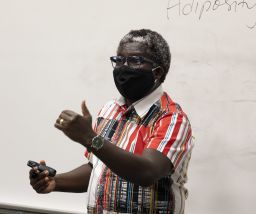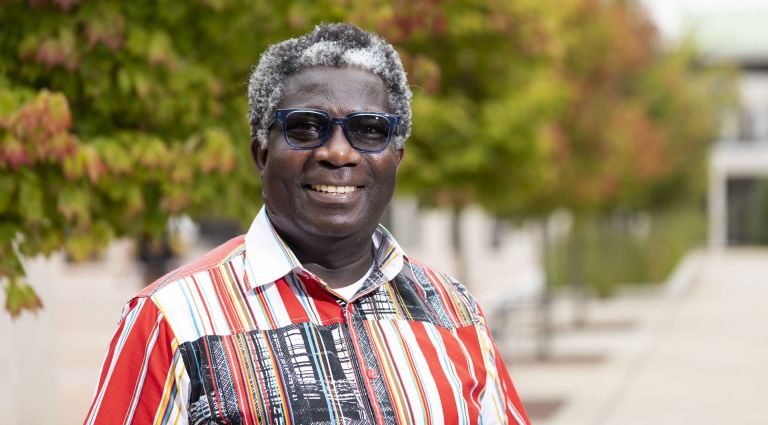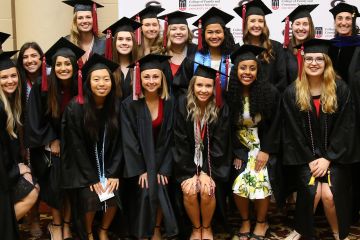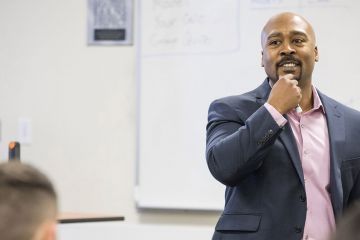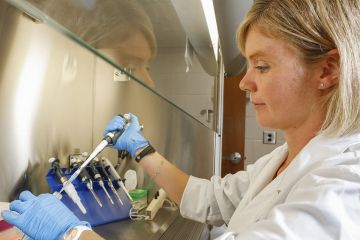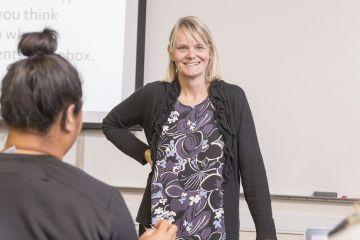Ensuring a healthier next generation
Alex Anderson’s informal education in nutrition began at the age of 5 in a bus station in his native Ghana, helping his mother sell everything from bread to boiled eggs to sugar cane.
It was there he began to witness firsthand the impact malnutrition and lack of access to health care made on his homeland, as evidenced by the high maternal and infant mortality rates.
“Although my mom was illiterate, she was able to complement foods for adequate nutrition,” Anderson said, “so none of my siblings developed malnutrition. But I saw a lot of pregnant women who died in childbirth, and a lot of kids walking around malnourished.”
Anderson’s formal education in the field, and what eventually brought him to America as a young graduate student, began in an introductory nutrition course his first semester at the University of Ghana.
“I lit up,” he said. “Something clicked in me, and I thought to myself, ‘In Ghana, the best way to improve our health is to improve nutrition using public health approaches.’ If we are able to educate these women and children about their health and nutrition and how to better complement foods, we can prevent some of these diseases.”
Now a professor in the University of Georgia College of Family and Consumer Sciences department of nutritional sciences, Anderson’s research focuses on infant and maternal health as well as community and international interventions for nutrition and health.
Anderson’s teaching philosophy took shape when, as a young minority graduate student at Tufts University, faculty members expressed an interest in helping him overcome the initial culture shock. Two decades later, he now seeks to do the same for his own international students.
“Having professors who were interested in my success shaped me,” he said. “In Ghana, you have little to no interaction with professors. You can’t approach them. Here, I could approach them, and they directed me to resources and helped me be successful.”
Anderson arrived at UGA in 2005 immediately after completing his doctorate at the University of Connecticut. In 2008, he established a summer service-learning practicum in Ghana for students interested in careers in the medical field.
Students receive hands-on training via health and nutrition screenings and visit hospitals for observations and shadowing of doctors and nurses. They also attend lectures on nutrition and public health issues in Ghana.
If women are healthy and continue to be healthy throughout pregnancy, they are going to give birth to healthier babies. Then they guide them and feed them to become healthier children and adults. That’s why my research focuses on making sure our next generation is healthy so we can have a productive nation.
“I’m very proud of the students who go with me to Ghana,” Anderson said. “Apart from the academic aspect of the program, it’s also a life-changing experience. You can tell the growth that is happening within the 4- to 5-week period we are in Ghana.”
For many students, it’s their first time abroad as well as their first time experiencing life as a minority.
“That comes with its own challenges,” Anderson said, “but I tell them it’s also an opportunity for them to learn, to feel and to empathize with minorities here in the United States.”
As part of the experience, Anderson’s students write blog entries covering their time in Ghana. One recent student wrote of a friendship she forged with a midwife named Sandra.
“At the end of the day,” the student wrote, “Sandra let me perform one of the checkups, and I was able to feel the baby and find the fetal heartbeat: thump, thump, thump. Currently, I’m in the midst of applying to medical school, and the strenuous application process has left me questioning at times my decision to pursue this as a future career. However, doing the fetal checkup and playing a small role in an unborn baby’s life reminded me of the purpose of it all—to use health care to serve others in all phases of life.”
These stories and experiences remind Anderson of his own awakening as a young student interested in public health and nutrition, and it’s what motivates him to continue investing in the next generation of leaders.
“I tell my students that women hold the key to health and productivity of future generations in any country,” Anderson said. “If women are healthy and continue to be healthy throughout pregnancy, they are going to give birth to healthier babies. Then they guide them and feed them to become healthier children and adults. That’s why my research focuses on making sure our next generation is healthy so we can have a productive nation.”
Alex Kojo Anderson
Professor
Department of Nutritional Sciences
Ph.D., Nutritional Sciences, University of Connecticut, 2005
MPH, Epidemiology, University of Connecticut, 2005
M. Phil., Human Nutrition, University of Ghana, 2001
B.Sc., Nutrition and Food Science, University of Ghana, 1998
At UGA: 15 years
